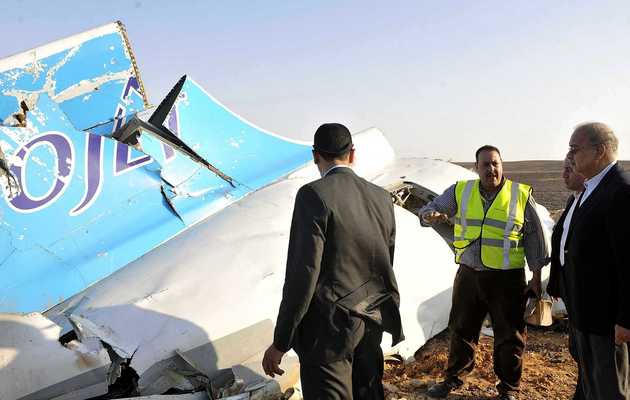Russian plane crash, all 224 passengers died
Investigation begins into cause of A321 crash. Both black boxes recovered as Russian aviation regulator cautions against speculation on causes of crash
The Guardian · CAIRO · 01 NOVEMBER 2015 · 15:00 CET

Russian and Egyptian investigators have been trying to establish the cause of thecrash of a Russian airliner in the Sinai peninsula, after an Islamist group claimed to have “brought it down” on behalf of Islamic State. All 224 passengers, including 17 children, on board the plane died after it crashed 23 minutes into its flight from Sharm el-Sheikh to St Petersburg. Most of those on board were Russian tourists.
Airbus A320 safety record in spotlight after Russia plane crash
A group that said it was speaking on behalf of Isis later posted an online statement claiming: “Soldiers of the caliphate were able to bring down a Russian plane above Sinai province.”
Several radical Islamist groups have called for attacks on Russian targets since it began airstrikes on Isis forces in Syria in late September, but experts were sceptical that militants had weapons able to reach the plane, which was flying at an altitude of more than 30,000ft.
Russia’s transport minister, Maksim Sokolov, said that the claim Isis militants brought down the plane “can’t be considered accurate”. Mohamed Samir, Egypt’s army spokesman, also disputed the claim, saying: “They can put out whatever statements they want but there is no proof at this point that terrorists were responsible for this plane crash. We will know the true reasons when the Civil Aviation Authority in coordination with Russian authorities completes its investigation. But the army sees no authenticity to the claims.”
The Russian aviation regulator, Rosaviatsia, urged caution while the cause of the crash was being investigated, saying: “Until there is reliable evidence about the circumstances of what happened, there is no sense in putting forward and discussing any versions.”
However, the claims are likely to impact on the Russian public’s attitude to the country’s involvement in Syria, where Vladimir Putin, president of Russia, has launched airstrikes in support of President Bashar al-Assad and against Isis fighters.
Investigators said they were checking fuel samples from the last refuelling stop, in the Russian city of Samara, and have focused on the possibility that a technical failure could have caused the 18-year-old plane to crash.
A spokesman said investigators were questioning people who were involved in preparing the aircraft and its crew and were carrying out searches at Moscow’s Domodedovo airport where the airline that operated the plane was based.
Kogalymavia, which is also known as Metrojet, was quoted by news agency Ria Novosti as saying that there were “no grounds” to blame the tragedy on human error. Captain Valery Nemov, 48, had 3,682 hours of flight time and had learned to fly the A321 at a training centre in Turkey in 2008.
Various reports suggested that a mechanical problem could have played a role. Security sources said an initial examination of the crash site showed the plane went down due to a technical fault, Reuters reported. Ria Novosti quoted a source in Sharm el-Sheikh airport as saying that the crew of the A321 appealed to the airport’s technicians due to “engine start failures several times over the past week”.
The Rusia president, Vladimir Putin, spoke on the phone to his Egyptian counterpart Abdel Fatah al-Sisi to discuss the crash, the Kremlin said in a statement. Sisi offered deep condolences and Putin promised the widest possible participation of Russian specialists in the investigation into the cause of the crash, the Kremlin said.
Distraught relatives gathered throughout Saturday at St Petersburg’s Pulkovo airport, where the flight had been due to land at 12.10pm local time. The youngest victim of the crash was believed to be 10 months old.
Viktoria Sevryukova, 24, was another of the names on a passenger list published by Russia’s Association of Tour Operators. She had posted photographs of herself relaxing on the beach during her holiday in Sharm el-Sheikh.
Sevryukova’s friend, Yevgenia Beryozina, told the Guardian she felt emptiness and could not believe the news. “She was my best friend – she had waited for this trip like I don’t know what,” Beryozina said. “And now she’s gone. Just like that, she’s gone.” Beryozina described Sevryukova as “positive, smart and sociable” and that “everything was just starting to work out” in her life. “It’s just not fair,” she said.
“I now see a tragic scene,” an Egyptian security officer at the site told Reuters by telephone. “A lot of dead on the ground and many who died whilst strapped to their seats. The plane split into two, a small part on the tail end that burned, and a larger part that crashed into a rockface. We have extracted at least 100 bodies and the rest are still inside.” The officer asked to remain anonymous.
Both black boxes of the plane had been found, Mohamed Hossam Kemal, the civil aviation minister, told a news conference.
Published in: Evangelical Focus - world - Russian plane crash, all 224 passengers died
